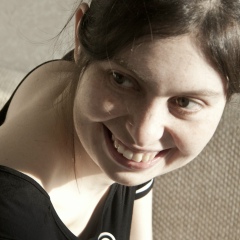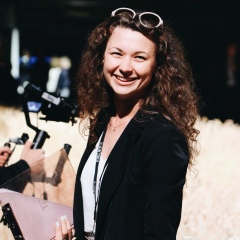«Человека надо охранять от человека.»
(об опере «Дневник Анны Франк» в Мариинском театре)
Когда я училась в начальной школе, в дни снятия блокады, прорыва блокады, победы учительница назидательно спрашивала нас: а поздравили ли мы своих бабушек и дедушек с праздником. И из того, как она этот вопрос задавала, было очевидно, что тот, кто не поздравил – нехороший и неблагодарный.
Мне в эти моменты становилось сразу очень неловко, т.к. в моей семье не было принято никого поздравлять. Хотя у меня были тогда ещё две бабушки и дедушка, пережившие войну (дедушка провёл в Ленинграде самую страшную блокадную зиму 1941-42 годов и много мне про это рассказывал). И вот как-то я решила спросить своих ветеранов и блокадников, а надо ли их поздравлять. И оказалось, что НЕТ, НЕ НАДО: у всех во время войны погибли отцы, одна бабушка осталась круглой сиротой, один мой прадед погиб в день снятия блокады, другой в день прорыва блокады. Им не то что праздновать не хотелось, им вспоминать не хотелось.
И мне редко хочется вспоминать: слишком сильное впечатление на меня в детстве произвели рассказы родственников и военные, блокадные хроники, фото из концлагерей, которые много крутили по телевизору. Но чем больше времени проходит, тем важнее вспоминать и рассказывать тем, кто, к счастью, этого не знал.
И мне кажется очень важным то, как отметили в Мариинском театре Международный день памяти жертв Холокоста, который совпадает с Днем снятия блокады. Моноопера «Дневник Анны Франк» – это выдержки из дневника еврейской девочки, которая пряталась вместе со своей семьей в «убежище» (на чердаке дома в Амстердаме), чтобы не попасть в концлагерь. Две семьи (всего семь человек) скрывались там с 1942 по 1944 год, затем убежище обнаружили, и все его обитатели оказались в концлагере. Все, кроме одного (отца Анны), погибли. Освободившись, Отто Франк посвятил свою жизнь публикации и «популяризации» дневника дочери.
Григорий Фрид написал оперу в 1969 году. В интервью композитор сказал, что в своей опере он хотел показать, как люди были вынуждены прятаться от фашистов, как от ЗВЕРЕЙ!
Дневник наполнен страхом, отчаяньем, надеждой и жизнью: «У человека всегда остается прекрасное: природа, солнце, свобода. Что может быть лучше на свете, чем молча смотреть с чердака, из окошка, на волю, и слушать, как птицы поют, и чувствовать солнце, и молча стоять так, прижавший друг к другу, и молча стоять».
Но если честно, то на меня гораздо большее впечатление произвело либретто (это выдержки из дневника, которые звучат в опере) и фильм о создании оперы, который показывали в фойе перед представлением, чем сама опера.
У солистки (Дианы Казарян) прекрасный, сильный, очень красивый голос. Но музыка для меня оказалась слишком сложной, а разобрать слова было практически невозможно. И хотя Диана играла очень выразительно, внешне она совсем не похожа на девочку подростка, истощенную от голода, страха и долгого заточения.
Зато, когда солистку мне было не видно (место у меня были не самое удачное), а была видна только её тень на стене, эффект был куда более сильным. Поющая, мечущаяся по стене тень, которая напоминает нам о жизни – хорошая идея для постановки, по-моему.
Страшно, когда люди становятся зверями, и когда человека нужно защищать от человека!
(об опере «Дневник Анны Франк» в Мариинском театре)
Когда я училась в начальной школе, в дни снятия блокады, прорыва блокады, победы учительница назидательно спрашивала нас: а поздравили ли мы своих бабушек и дедушек с праздником. И из того, как она этот вопрос задавала, было очевидно, что тот, кто не поздравил – нехороший и неблагодарный.
Мне в эти моменты становилось сразу очень неловко, т.к. в моей семье не было принято никого поздравлять. Хотя у меня были тогда ещё две бабушки и дедушка, пережившие войну (дедушка провёл в Ленинграде самую страшную блокадную зиму 1941-42 годов и много мне про это рассказывал). И вот как-то я решила спросить своих ветеранов и блокадников, а надо ли их поздравлять. И оказалось, что НЕТ, НЕ НАДО: у всех во время войны погибли отцы, одна бабушка осталась круглой сиротой, один мой прадед погиб в день снятия блокады, другой в день прорыва блокады. Им не то что праздновать не хотелось, им вспоминать не хотелось.
И мне редко хочется вспоминать: слишком сильное впечатление на меня в детстве произвели рассказы родственников и военные, блокадные хроники, фото из концлагерей, которые много крутили по телевизору. Но чем больше времени проходит, тем важнее вспоминать и рассказывать тем, кто, к счастью, этого не знал.
И мне кажется очень важным то, как отметили в Мариинском театре Международный день памяти жертв Холокоста, который совпадает с Днем снятия блокады. Моноопера «Дневник Анны Франк» – это выдержки из дневника еврейской девочки, которая пряталась вместе со своей семьей в «убежище» (на чердаке дома в Амстердаме), чтобы не попасть в концлагерь. Две семьи (всего семь человек) скрывались там с 1942 по 1944 год, затем убежище обнаружили, и все его обитатели оказались в концлагере. Все, кроме одного (отца Анны), погибли. Освободившись, Отто Франк посвятил свою жизнь публикации и «популяризации» дневника дочери.
Григорий Фрид написал оперу в 1969 году. В интервью композитор сказал, что в своей опере он хотел показать, как люди были вынуждены прятаться от фашистов, как от ЗВЕРЕЙ!
Дневник наполнен страхом, отчаяньем, надеждой и жизнью: «У человека всегда остается прекрасное: природа, солнце, свобода. Что может быть лучше на свете, чем молча смотреть с чердака, из окошка, на волю, и слушать, как птицы поют, и чувствовать солнце, и молча стоять так, прижавший друг к другу, и молча стоять».
Но если честно, то на меня гораздо большее впечатление произвело либретто (это выдержки из дневника, которые звучат в опере) и фильм о создании оперы, который показывали в фойе перед представлением, чем сама опера.
У солистки (Дианы Казарян) прекрасный, сильный, очень красивый голос. Но музыка для меня оказалась слишком сложной, а разобрать слова было практически невозможно. И хотя Диана играла очень выразительно, внешне она совсем не похожа на девочку подростка, истощенную от голода, страха и долгого заточения.
Зато, когда солистку мне было не видно (место у меня были не самое удачное), а была видна только её тень на стене, эффект был куда более сильным. Поющая, мечущаяся по стене тень, которая напоминает нам о жизни – хорошая идея для постановки, по-моему.
Страшно, когда люди становятся зверями, и когда человека нужно защищать от человека!
“Man must be protected from man.”
(about the opera Anne Frank Diary at the Mariinsky Theater)
When I was in elementary school, in the days of lifting the blockade, breaking the blockade, victory, the teacher instructively asked us: did we congratulate our grandparents on the holiday. And from the way she asked this question, it was obvious that the one who did not congratulate was bad and ungrateful.
I immediately felt very embarrassed at these moments, because in my family it was not customary to congratulate anyone. Although I then had two more grandmothers and a grandfather who survived the war (grandfather spent the worst blockade winter of 1941-42 in Leningrad and told me a lot about it). And somehow I decided to ask my veterans and blockade members if they should be congratulated. And it turned out NO, NOT NECESSARY: everyone lost their fathers during the war, one grandmother remained an orphan, one my great-grandfather died on the day the blockade was lifted, the other on the day the blockade was broken. They didn’t want to celebrate, they didn’t want to remember.
And I rarely want to remember: my childhood stories were too much made by the stories of relatives and the military, the besieged chronicles, and photos from concentration camps that were played on television a lot. But the more time passes, the more important it is to remember and tell those who, fortunately, did not know this.
And it seems to me very important how the International Holocaust Remembrance Day was celebrated at the Mariinsky Theater, which coincides with the Day of lifting the blockade. The monoopera “Anne Frank Diary” is an excerpt from the diary of a Jewish girl who was hiding with her family in a “refuge” (in the attic of a house in Amsterdam) so as not to end up in a concentration camp. Two families (a total of seven people) hid there from 1942 to 1944, then they found a shelter, and all its inhabitants ended up in a concentration camp. All but one (Anna's father) died. Freed, Otto Frank devoted his life to publishing and “popularizing” his daughter’s diary.
Gregory Fried wrote the opera in 1969. In an interview, the composer said that in his opera he wanted to show how people were forced to hide from the Nazis, like from ANIMALS!
The diary is filled with fear, despair, hope and life: “A person always has beauty: nature, the sun, freedom. What could be better in the world than to look silently from the attic, from the window, at will, and listen to the birds singing, and feel the sun, and silently stand there, pressed against each other, and silently stand. ”
But to be honest, I was much more impressed with the libretto (these are excerpts from the diary that sound in the opera) and the film about the creation of the opera, which was shown in the lobby before the performance than the opera itself.
The soloist (Diana Ghazaryan) has a beautiful, strong, very beautiful voice. But the music was too complicated for me, and it was almost impossible to make out the words. And although Diana played very expressively, outwardly she does not at all look like a teenage girl exhausted from hunger, fear and long imprisonment.
But when the soloist was not visible to me (my place was not the most successful), and only her shadow was visible on the wall, the effect was much stronger. The singing shadow that rushes along the wall that reminds us of life is a good idea for a production, in my opinion.
It is terrible when people become beasts, and when a person needs to be protected from a person!
(about the opera Anne Frank Diary at the Mariinsky Theater)
When I was in elementary school, in the days of lifting the blockade, breaking the blockade, victory, the teacher instructively asked us: did we congratulate our grandparents on the holiday. And from the way she asked this question, it was obvious that the one who did not congratulate was bad and ungrateful.
I immediately felt very embarrassed at these moments, because in my family it was not customary to congratulate anyone. Although I then had two more grandmothers and a grandfather who survived the war (grandfather spent the worst blockade winter of 1941-42 in Leningrad and told me a lot about it). And somehow I decided to ask my veterans and blockade members if they should be congratulated. And it turned out NO, NOT NECESSARY: everyone lost their fathers during the war, one grandmother remained an orphan, one my great-grandfather died on the day the blockade was lifted, the other on the day the blockade was broken. They didn’t want to celebrate, they didn’t want to remember.
And I rarely want to remember: my childhood stories were too much made by the stories of relatives and the military, the besieged chronicles, and photos from concentration camps that were played on television a lot. But the more time passes, the more important it is to remember and tell those who, fortunately, did not know this.
And it seems to me very important how the International Holocaust Remembrance Day was celebrated at the Mariinsky Theater, which coincides with the Day of lifting the blockade. The monoopera “Anne Frank Diary” is an excerpt from the diary of a Jewish girl who was hiding with her family in a “refuge” (in the attic of a house in Amsterdam) so as not to end up in a concentration camp. Two families (a total of seven people) hid there from 1942 to 1944, then they found a shelter, and all its inhabitants ended up in a concentration camp. All but one (Anna's father) died. Freed, Otto Frank devoted his life to publishing and “popularizing” his daughter’s diary.
Gregory Fried wrote the opera in 1969. In an interview, the composer said that in his opera he wanted to show how people were forced to hide from the Nazis, like from ANIMALS!
The diary is filled with fear, despair, hope and life: “A person always has beauty: nature, the sun, freedom. What could be better in the world than to look silently from the attic, from the window, at will, and listen to the birds singing, and feel the sun, and silently stand there, pressed against each other, and silently stand. ”
But to be honest, I was much more impressed with the libretto (these are excerpts from the diary that sound in the opera) and the film about the creation of the opera, which was shown in the lobby before the performance than the opera itself.
The soloist (Diana Ghazaryan) has a beautiful, strong, very beautiful voice. But the music was too complicated for me, and it was almost impossible to make out the words. And although Diana played very expressively, outwardly she does not at all look like a teenage girl exhausted from hunger, fear and long imprisonment.
But when the soloist was not visible to me (my place was not the most successful), and only her shadow was visible on the wall, the effect was much stronger. The singing shadow that rushes along the wall that reminds us of life is a good idea for a production, in my opinion.
It is terrible when people become beasts, and when a person needs to be protected from a person!

У записи 9 лайков,
1 репостов,
280 просмотров.
1 репостов,
280 просмотров.
Эту запись оставил(а) на своей стене Наталья Коробкина



























